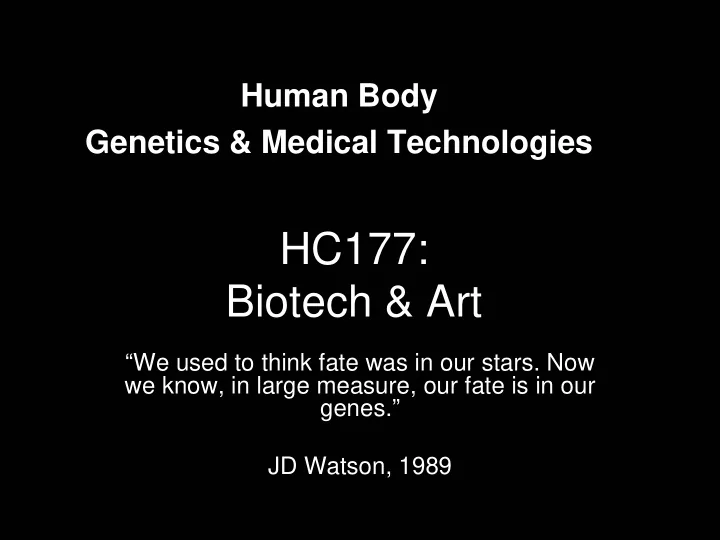

Human Body Genetics & Medical Technologies HC177: Biotech & Art “We used to think fate was in our stars. Now we know, in large measure, our fate is in our genes.” JD Watson, 1989
Medical technologies Human BODY &
HUMAN DISSECTION
The Anatomy Lesson of Dr. Nicolaas Tulp, Rembrandt van Rijn (1606–1669) Leonardo da Vinci performed private studies, in which he dissected human bodies. These formed the basis for his detailed, lifelike, anatomical drawings. He thus made a significant contribution to social acceptance of the study of the human body.
PLASTINATION Invented by German anatomist Dr. Gunther von Hagens in 1977, is a process whereby all bodily fluids and soluble fats are replaced with reactive plastics that harden after curing with light, heat or gas. All tissue structures are retained.
VISIBLE HUMAN PROJECT
HUMAN GENOME PROJECT April 25, 2007 - On April 25, 2007 – the fifth anniversary of National DNA Day, the House passed the Genetic Information Non-discrimination Act of 2007 by a vote of 420-3.
DIGITAL BODY DATA BODY CORPORATE BODY
Invention of X-rays Mrs. Röntgen's hand, the first X-ray picture of the human body ever taken.
X ray machine, 1910
Major developments in 1920's medicine included Insulin and Penicillin
Pharma & Money
TRANSHUMANISM
CRYONICS In 1964, physics teacher Robert Ettinger published The Prospect of Immortality , a book which promoted the concept of cryonics to a wide audience. Ettinger subsequently founded his own cryonics organization. This "bigfoot" Dewar is custom-designed to contain four wholebody patients and six neuropatients immersed in liquid nitrogen at − 196 degrees Celsius. The Dewar is an insulated container which consumes no electric power. Liquid nitrogen is added periodically to replace the small amount that evaporates.
Body modification
Octo Mom
Male Pregnancy
ORLAN
Regrowing Body Parts
DNA in the market
Biotech Art & Body
Nancy Burson
Jennifer Willet
Kira O’Reilly
Events Natalie Jeremijenko Lisa Jevbratt Gil Kuno Katherine Hayles
Recommend
More recommend